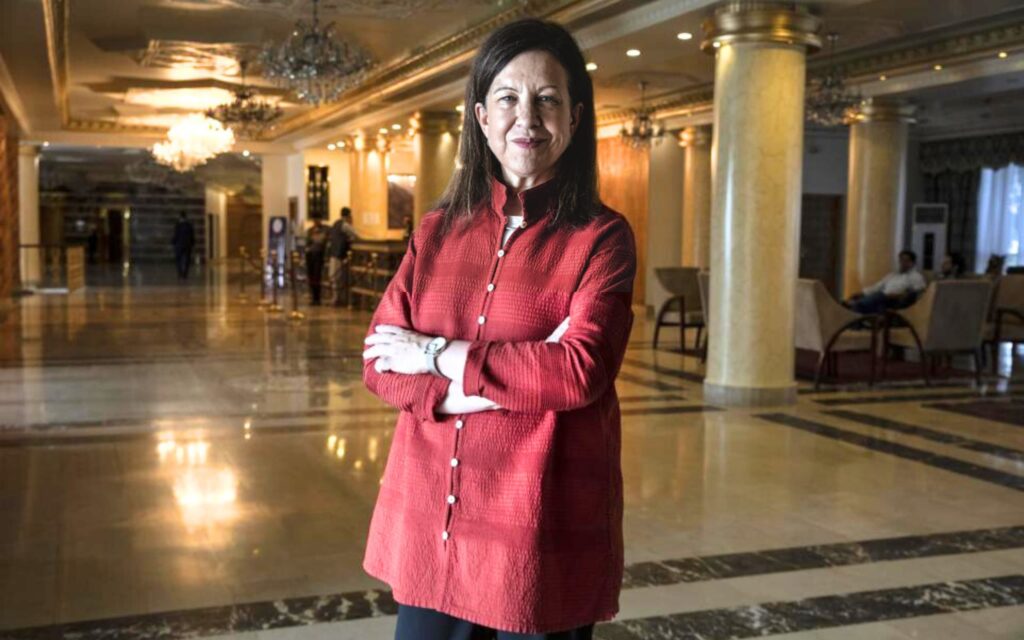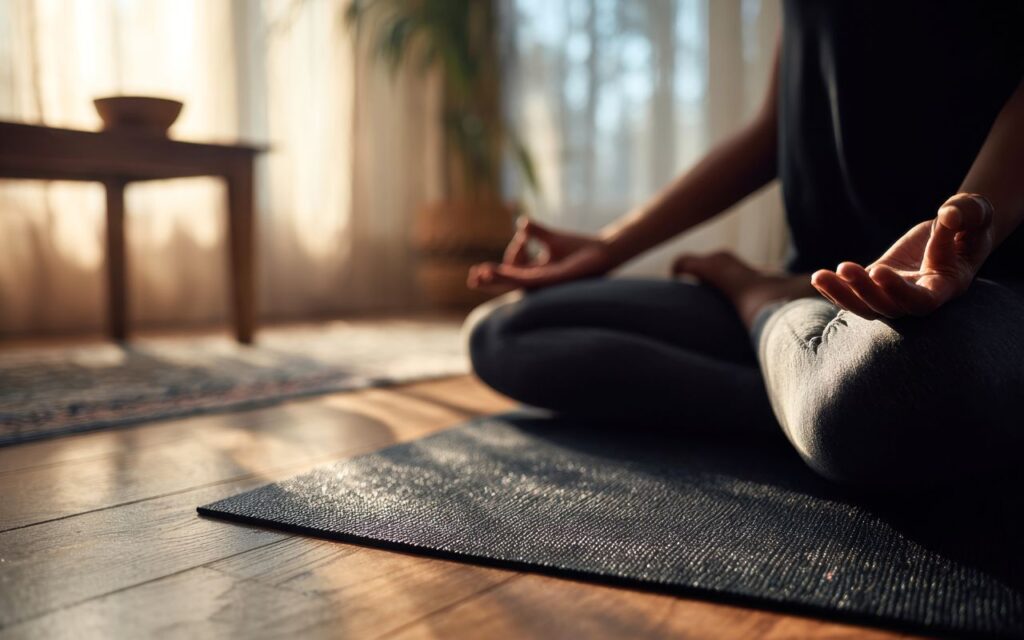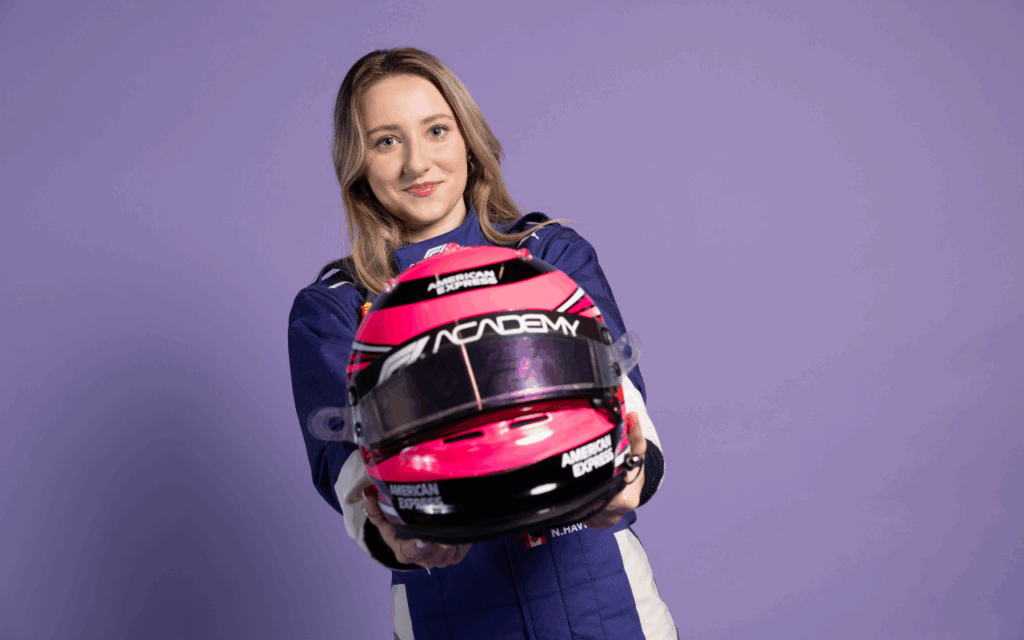
Jennifer Stewart: Nicole Havrda, welcome to The Honest Talk! Where are you joining us from today?
Nicole Havrda: Today I’m at Mid-Ohio raceway, just watching this weekend, which kind of sucks, because I don’t do good with just sitting at the raceway! I’m just struggling this whole weekend!
Jennifer Stewart: I get the feeling you’re at the raceway quite a bit. I think we just heard a car zip by really, really quickly. So, how much of your life is spent near a track?
Nicole Havrda: I want to say, not actually that much. It depends, I’m kind of everywhere! Sometimes I’m home, and then sometimes I go to the track. I currently actually live in Indianapolis, so the Raceway is right by my house which is quite nice, but when I go back to Vancouver, it’s quite far from the racetrack.
Catherine Clark: So what first sparked your interest in motorsport? And how did this evolve into competing with F1 Academy?
Nicole Havrda: Yeah, definitely. I mean, I was never really interested in motorsports – it just wasn’t my thing. I didn’t like sports cars. My dad used to do some stuff on the track just for fun, and he was into Formula One. But this was way back, around 2017, and at the time, I was focused on going to the Olympics and getting a scholarship for swimming.
Then my dad brought me to a racetrack to watch a Formula One race because he had always wanted to see one live. I didn’t want to go – I wasn’t interested at all. We were actually on a road trip through Europe, visiting family and such, and we ended up going to this race. I remember walking by the track when the cars zoomed past us, and I was just like: I love this. I want to do this. Get me into this.
I think what I was really missing in my life was adrenaline. Swimming doesn’t really give you that. I don’t want to say I was bored with swimming, but it just didn’t give me the same kind of rush that racing does. Racing gives me this tingly sensation – like adrenaline rushing through my body – and I fell in love with it right away.
After that, I got into go-karting. From there, I moved into open-wheel cars and even did some sports car stuff. But it was definitely the adrenaline that sparked everything for me.
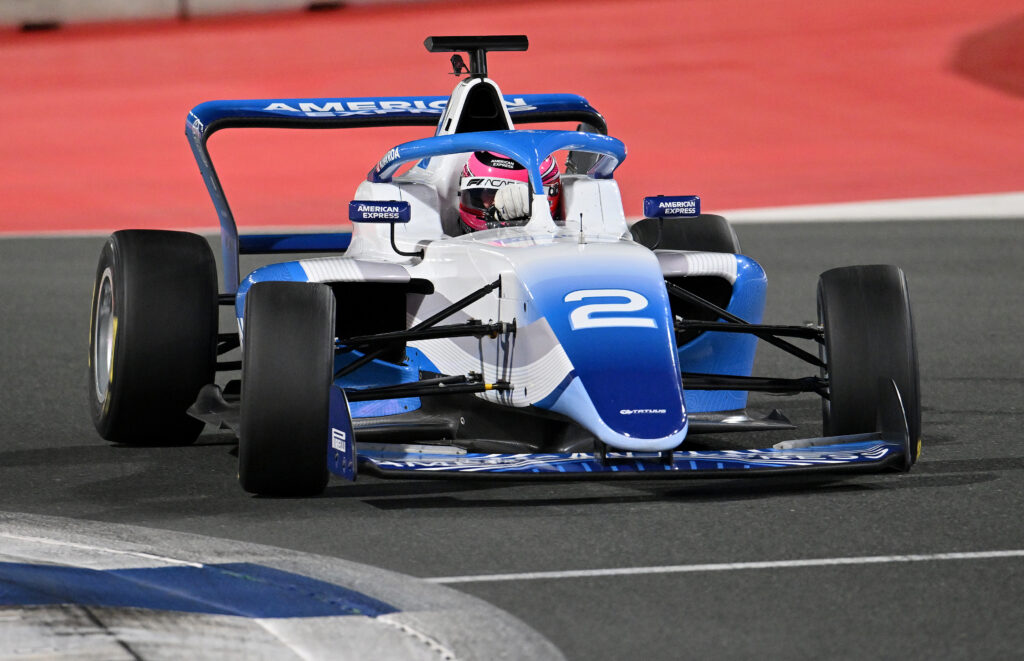
Jennifer Stewart: So you’re an adrenaline junkie, which is neat! Of course, the sport is very competitive and it’s very, very physical. What have been the toughest challenges that you have faced both on the track and off the track throughout your career so far?
Nicole Havrda: I’d say the biggest challenge – and one I still face, like many racers – is the mental side of the sport. Yes, there are physical demands, like the high G-forces and overall intensity, but racing is incredibly mental. Getting past those internal barriers is tough.
I think the biggest thing is truly believing in yourself and that you belong there. When I first got to F1 Academy, I remember thinking, ‘Do I really belong here?’ It felt so big – like, this is the world stage. You’re racing alongside Formula One, and it’s surreal. Sitting on the grid, seeing people like Susie Wolff walk by regularly, being surrounded by F1 drivers…it’s wild.
Then I come back to some of the older series I used to race in, and I’m like, Wow – the difference is huge. It really hits you: this is F1.
So a big part of the challenge is overcoming that mental block. If you’re not careful, it’s easy to fall into a spiral of I don’t belong here, I’m not good enough, and all that self-doubt.
There are also so many eyes on us now. At the Montreal race, the grandstands were packed, it was crazy. Normally during support races, people take a break, head to the fan zone, grab a drink or something. But this time, people were staying, sitting down and actually watching the Academy race. That felt unreal.
It’s grown so much, especially with the new Netflix show on the F1 Academy. It’s brought a lot of attention, and with that comes a lot of media, a lot of marketing, and just a lot happening all at once.
People back home ask me all the time, ‘How’s the Academy? It must be intense.’ And it really is. There’s so much going on – it’s exciting but definitely overwhelming at times.
Catherine Clark: Jen and I want to follow up on something you mentioned about questioning whether you belong. My family are big F1 fans – my son was actually in the grandstands watching you at the Grand Prix.
I understand that during race weekends, you’re in the paddock with F1 drivers like Lewis Hamilton, who’s been a strong supporter of women in motorsport, and Susie Wolff, who’s leading important change in the space.
What kind of advice or insights have you received from F1 drivers or mentors like them? How has that helped you grow – not just as a driver physically, but also mentally and emotionally?
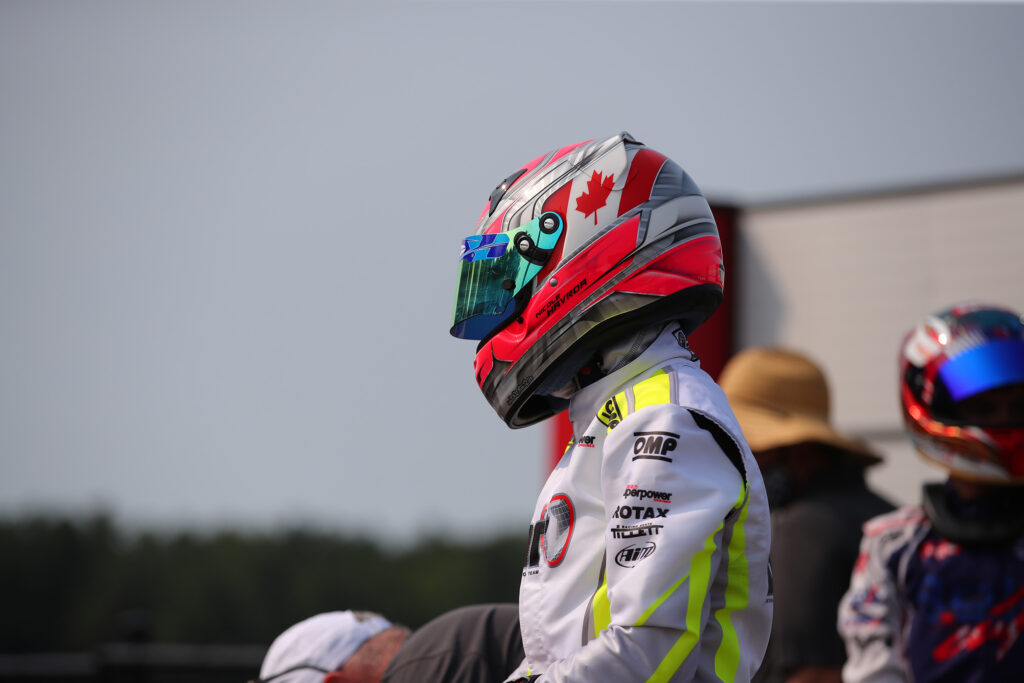
Nicole Havrda: Yeah, it’s honestly huge. I was having a moment in Montreal, and just having Susie Wolff walk up to me and start chatting – it wasn’t even about racing professionally, it was just about life. We were talking about her son racing go-karts, and just kind of relating over racing stuff.
I mean, she’s made it to F1, right? She tested in F1, and it’s so huge having that support behind us. She understands what we’re going through, she knows the biggest part is the racing.
Even having the F1 drivers come over and walk through our paddock – like, we’re a bit far from the F1 paddock, but still, they come to us. They’ll just walk over and start chatting about something, or do interviews with us, or play games. We do a lot of activations that connect F1 Academy with F1, because we’re very supported by F1.
It’s quite surreal how much they support us. I remember the W Series – it was similar to the Academy, but I want to say the Academy is more organized. The difference is honestly crazy. W Series was often treated more like a support race, like an add-on. It didn’t always feel like a big event. They’d give you time only if there was time.
I remember talking to drivers who said they were racing super early in the morning, like 7 a.m., and that doesn’t help. You want to be racing right before F1. Now, we’re racing literally an hour before Formula One, when everyone’s in the grandstands, everyone’s watching, even the F1 drivers.
We’ll be sitting on the starting grid and see Lewis Hamilton walk by – or Toto Wolff, or Christian Horner – and they’ll say good luck. Even just that little “good luck” is really cool. Seeing that they care, that they’re there, it’s huge.
Jennifer Stewart: What’s your workout regime like?
Nicole Havrda: It’s a lot! Even though I raced in Formula Regional before – which is closer to Formula 3 and definitely more physical – moving into F1 Academy, which uses a Formula 4 car, was actually a pretty easy transition for me. It’s not very physical.
That said, I have to mention Saudi Arabia – it’s hot. Like, really hot. My biggest training prep for Jeddah was literally putting on my race suit and sitting in a sauna until I was drenched. Even though it’s a dry kind of heat, it was so hot it sometimes felt hard to breathe.
At least we were racing at night, so the sun wasn’t directly on us, but still, with all the race gear on, it got really intense.
Another big part of preparation is the simulator. One of the hardest things with F1 Academy is that we don’t get much driving time. Like in Montreal, we only had one FP1 session—so you had to be on it right away. The simulator becomes really important because it’s basically the only seat time we get before race weekends.
In Montreal, all of us were still learning the track, figuring out what changes to make to the car. No team had raced there before – it was F1 Academy’s first time in Montreal – so every lap mattered.
The simulator helps replicate that, even if it’s not exactly the same. But you’re still driving, still holding the wheel, so it’s super helpful.
Physically, cardio is also a big focus right now. Our races are short– about 35 minutes – but we’re training for the next level, which will be more physical. We all know that. So behind the scenes, there’s definitely a lot of training going on.
Catherine Clark: When you talk about the next level, do you foresee a time when women are going to be a full time part of F1 racing?
Nicole Havrda: Yeah, for sure, I think you just have to find the right girl that’s going to be capable of doing it.
Jennifer Stewart: Are you that girl?
Nicole Havrda: I hope so! I think that’s the biggest goal. Even though sometimes I tell myself, let’s think realistically, honestly, I’d be happy reaching any of the highest levels of racing.
Whether that’s IndyCar – since I’m from North America, IndyCar is definitely on the list – or sports cars, or LMP and endurance racing.
I’ve seen a few girls try different paths. Like, I remember last year, Jamie Chadwick was racing in Indy NXT and doing really, really well. Then she tested in IndyCar and realized it was too physical, so she ended up going to LMP2s, which aren’t exactly sports cars but are more in the endurance racing world.
It’s definitely interesting to watch where other racers are going. Right now, a lot of people are heading to GB3, which is British F3 – basically just another step toward Formula Three.
So really, it’s all about figuring out what the next step is – the next right step.
Catherine Clark: You’re in such an incredible moment in time right now. Jen and I have the chance to speak with so many women who are really making waves in sports – and it truly feels like this is a moment for women in sports.
So, Nicole, what’s your advice for other young women who might be considering a life in sports, like you are – whether that’s motorsports specifically or taking a risk in a different area? What would you say to them?
Nicole Havrda: I’d say the biggest thing is enjoy the moment. Sometimes I struggle with living in the present, and it kind of sucks. I forget about things that happened, and I don’t enjoy them as much as I should.
So yeah, just enjoy it. Have fun. Embrace whatever comes your way.
I think life is really cool. Just being able to do amazing things, go out there, and break barriers – especially as a woman in motorsports. It’s such a male-dominated sport, so every time we push through those boundaries, we’re showing other girls that they can do it too.
The next generation is going to be right there. They’ll have everything – and I really believe we’re going to see a woman in Formula One soon.
Whatever it is you’re doing, my dad always tells me: you have to have fun with it. Go to work excited to be there, not dragging yourself through it.
Take it all in. Enjoy every moment. Have fun with it.


